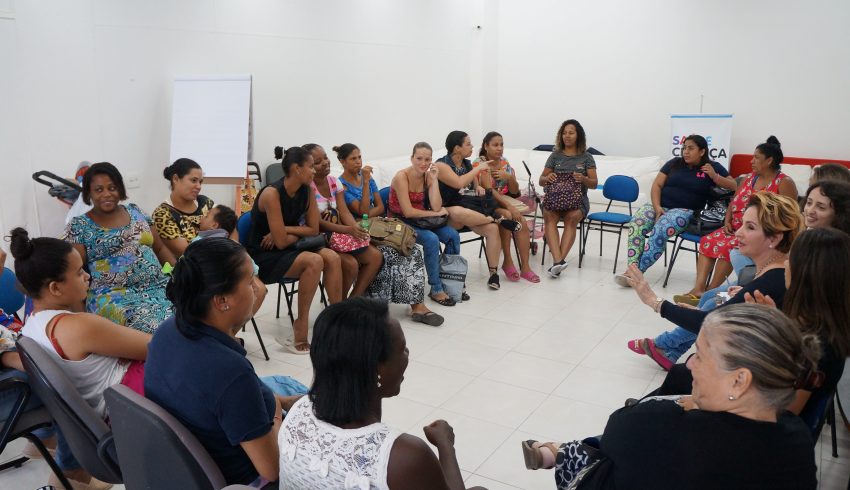By Fabiana Almeida Pádua, coordinator of Psychology at the Dara Institute
The Health area faces the challenge of showing the families served at Dara that believing in their potential is also a way of changing realities.
“Now I like myself better. Before, I couldn’t look at myself in the mirror because I got a little depressed, down. When I came here, I started to see things differently. I began to realize that we have to like ourselves…”
This statement was made by a mother attended by Dara, and that reflects something we often notice: a downcast look, hunched shoulders, and few words spoken in a quiet subdued voice. Body language emanates a condition common among the women who come to Dara: low self-esteem.
Our greatest work is to build up and strengthen these women. We do not deny that the situations faced are complex or that finding a solution may take time. We show how each one is indeed capable of facing and overcoming the difficulties and challenges they face to improve the family’s reality. From looking, listening, and following up, they begin to see themselves differently.
When they first arrive here, we make a photographic record of all the mothers who agree to this. They don’t know it, but at the end of the two years of service at Dara, they will have rediscovered themselves from that arrival day. Many do not even recognize themselves, such is the transformation.
The vulnerability in which they live, the often tough journey of caring for the house and children, many with serious health problems, consume all these women’s energy. Taking care of yourself sounds irrelevant, but that’s where change begins. It seems obvious, but we need to show that, in addition to a mother, there is also a woman there. And that the two can – and must – coexist.
In the intersectoral work that Dara’s team carries out, the impact of other areas is directly reflected in self-esteem and, thus, in the health of the families served. In the professional courses promoted by the Income area, for example, they learn makeup, gastronomy, and hairdressing techniques. They discover talents and potential that, often due to lack of stimulation and encouragement, they had never noticed or nurtured before.
Finding a support network, having the children help with household activities, taking care of health, food and exercising are also important and encouraged. Here they are encouraged to carry out periodic health checks. They learn about healthy eating and are encouraged to put this knowledge into practice at home. Body and mind in action to face challenges and change reality. That’s what we see happening.
We use Aconchego, our conversation circles on service days, to bring up topics related to self-esteem, self-care, and mental health, among many other themes. It is a community space for in-depth and profound exchanges. One of the greatest contributions is providing support for these women to deal with very difficult situations and feelings, which they often cannot even identify.
This work of listening and welcoming can be the gateway for these women to speak and be heard, as they often had never been before. It is possible that they identify with similar challenges experienced by other women and discover new ways of dealing with situations. In addition to this support, we also provide individual consultations with our volunteers for psychological support.
Over the months we noticed that those downcast eyes, which could not look at us in the first consultation, give way to eye-to-eye contact. An upright posture indicates a person who has taken charge of his/her life. They become more communicative and begin to express doubts, needs, and desires. They share both their failures and achievements.
In the collective, they see the possibilities open to them from listening to other women. Here they learn about other perspectives of the world, to understand that, despite the difficulties, they can still achieve what they want, with dedication, support, and acceptance.
As one mother said, they let go – “I used to be a lot shyer than I am now, very shy indeed in fact. And these conversations helped me start to talk and open up” – and they also (re)discover themselves – “with the psychologist it was the only time that my life was discussed focused on me. I started to think more about myself, running after the things I want without feeling selfish about it. This transformation changed me, and even the way others see me”.
Array




